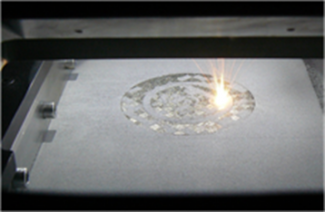LLT Lab
Since 2007, the Laboratory of Manufacturing processes by Laser Technologies (LLT) of Politecnico
di Bari has been working on Laser Additive Manufacturing processes of metals and on laser
micro-machining.
The laboratory currently houses a Selective Laser Melting (SLM) and a Laser Metal Deposition
machine, able to process metal powders. Both techniques are solid freeform fabrication processes
where 3D parts can be fabricated layer by layer by fusing metal powders with a high energy laser
beam.
SLM machine is equipped with a nanosecond Nd:YAG laser source with a maximum power of 100
W and a scanning head with deflecting mirrors to direct the laser beam over the powder platform.
The laser can operate in both continuous and pulse mode.
In continuous mode, it allows the selective laser sintering and selective laser melting of metal powders; in pulsed mode, it is able to fabricate micro-components by laser ablation, with a pulse
width in the nanosecond range and a repetition rate between 0 and 65kHz. Materials that can be
processed by selective laser melting are mainly steels. On the other hand, it is possible to treat
different materials (steels, titanium alloys, aluminum alloys, ceramics, glass, etc) by means of laser
micro-machining.
LMD machine is characterized by a 5-axis movement system and by an inert chamber that allows
processing several materials including reactive metals such us titanium and aluminum alloys.
LMD is used for solid freeform fabrication and for laser cladding.
The main research topics carried out in the laboratory are:
• Study and characterization of materials obtained by Selective Laser Melting and Selective
Laser Sintering
• Manufacturing of hybrid structures and porous structures with controlled density by Selective
Laser Melting
• Thermal treatments of sintered materials
• Laser surface processing of metals and glass
• Repair of aeronautic components by Laser Metal Deposition
• Freeform fabrication of complex geometries by Selective Laser Melting and Laser Metal
Deposition
• Laser Metal Deposition of WC by Functionally Graded Materials technique
• Development of numerical and analytical models for process optimization
